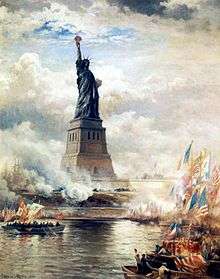Statue of Liberty National Monument
The Statue of Liberty National Monument is a United States National Monument comprising Liberty Island and Ellis Island in the U.S. states of New Jersey and New York.[5] It includes the Statue of Liberty (Liberty Enlightening the World) by sculptor Frédéric Auguste Bartholdi and the Statue of Liberty Museum, both situated on Liberty Island, as well as the former immigration station at Ellis Island which includes the Ellis Island Immigrant Hospital.
| Statue of Liberty National Monument | |
|---|---|
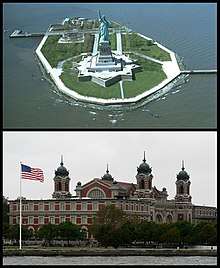 | |
| Location | Jersey City, New Jersey and New York City |
| Coordinates | 40°41′39″N 74°2′35″W |
| Governing body | U.S. National Park Service |
| Website | Statue of Liberty Ellis Island |
| Designated | October 15, 1924 Statue of Liberty[1] |
| Designated | May 11, 1965 Ellis Island[2] |
| Official name: Statue of Liberty National Monument, Ellis Island and Liberty Island | |
| Designated | October 15, 1966[3] |
| Reference no. | 66000058 |
| Official name: Statue of Liberty National Monument, Ellis Island and Liberty Island | |
| Designated | May 27, 1971 |
| Reference no. | 1535[4] |
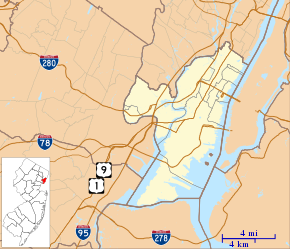 Location in Port of New York and New Jersey  Statue of Liberty National Monument (New York City) 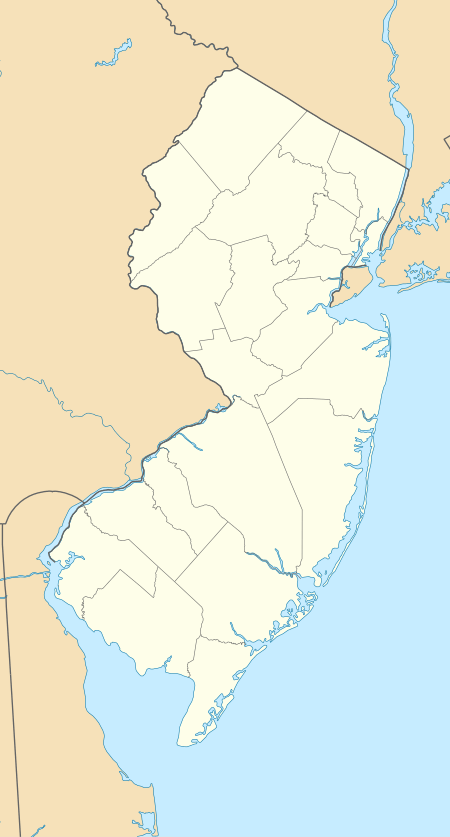 Statue of Liberty National Monument (New Jersey)  Statue of Liberty National Monument (New York)  Statue of Liberty National Monument (the United States) | |
The monument is managed by the National Park Service as part of the National Parks of New York Harbor office.
History
President Calvin Coolidge used his authority under the Antiquities Act to declare the statue a national monument in 1924.[1] In 1937, by proclamation 2250, President Franklin D. Roosevelt expanded the monument to include all of Bedloe's Island, and in 1956, an act of Congress officially renamed it Liberty Island.[6] Ellis Island was made part of the Statue of Liberty National Monument by proclamation of President Lyndon Johnson in 1965.[2] The United States historic district, a single listing on the U.S. National Register of Historic Places, was designated in 1966.[7]
The islands were closed during hurricane Sandy in October 2012 and suffered severe damage.[8][9][10][11][12] Liberty Island reopened July 4, 2013; Ellis Island re-opened October 24, 2013.[13]
On March 16, 2020 both islands closed due to the COVID-19 pandemic.[14] On July 20, 2020 the Statue of Liberty reopened partially under New York City's Phase IV guidelines, with Ellis Island continuing to remain closed.[15]
Significance
The Statue of Liberty is a world-famous symbol of freedom, given in 1886 by France to the United States in celebration of American Independence. Nearby Ellis Island was the first stop for millions of immigrants to the U.S. in the late 19th and early 20th centuries.[16] The national monument recalls this period of massive immigration to the United States.[17]
Inside the statue, a plaque is engraved with words from "The New Colossus", an 1883 poem by Emma Lazarus:[18]:165–166[19]:172–175
Give me your tired, your poor,
Your huddled masses yearning to breathe free,
The wretched refuse of your teeming shore.
Send these, the homeless, tempest-tossed to me,I lift my lamp beside the golden door!
Location and access
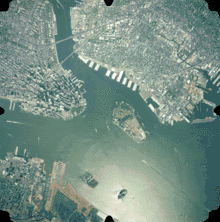
The national monument is located in Upper New York Bay east of Liberty State Park in Jersey City, New Jersey and southwest of Battery Park at the tip of Manhattan in New York City. Entrance is free, but there is a charge for the ferry service that all visitors must use.[20]
In 2007, a concession was granted to Statue Cruises to operate the transportation and ticketing facilities, replacing the Circle Line which had operated the service since 1953.[21] The waters are patrolled by the U.S. Park Police[22][23] to enforce the restriction on private boat landings. Ferries depart from both parks and all boats stop at both islands, enabling passengers to visit both islands and choose either destination on the return trip.[24][25]
Tickets can be purchased at Castle Clinton in Battery Park or at the Communipaw Terminal in Liberty State Park. Along with the ferry ticket, visitors intending to enter the statue's pedestal must also obtain a complimentary ticket.[26] Those wishing to climb the 154 stairs to the crown within the statue must obtain a special ticket, which may be reserved up to a year in advance. Ten people per group, three groups per hour, are permitted to ascend, allowing for a total of 240 per day. After an obligatory second security screening, they may bring only medication and cameras, leaving all other items in lockers provided.[26] Visitors intending to tour Ellis Island's south side, namely the Ellis Island Immigrant Hospital, must purchase a "Hard Hat Tour" ticket, which charges an additional fee on top of the regular ferry ticket.[27][28]
| Type | Children (age 0-3) | Children (age 4-12) | Adults | Seniors |
|---|---|---|---|---|
| Ferry ticket: Statue of Liberty (grounds only) and Ellis Island | free | $9 | $18.50 | $14 |
| Statue of Liberty pedestal access | free with reservation | ferry ticket and additional reservation required | ||
| Statue of Liberty crown access | prohibited | ferry ticket and additional $3 ticket required | ||
| Ellis Island Hard Hat Tour | prohibited | ferry ticket and additional $35 ticket required | ||
In 2019, the NPS announced that starting on May 16, 2019, tour groups will be banned from certain parts of the Statue of Liberty National Monument, such as the Statue of Liberty's observation deck and the Ellis Island museum. The NPS cited overcrowding for its decision. Although only 1,000 of the site's 24,000 daily visitors travel to the monument within tour groups, the NPS stated that these groups tend to block pedestrian flow within the monument.[29][30]
Jurisdiction
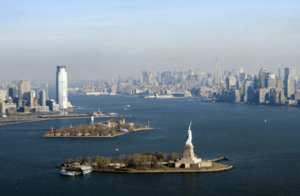
Liberty Island and Ellis Island have been the property of the United States government since 1800[6] and 1808, respectively.[31] Historical circumstances have led to the unusual situation of Liberty Island and 3.3 acres (13,000 m2) of Ellis Island being exclaves of New York, both completely surrounded by New Jersey. The dominion, jurisdiction, and sovereignty of the islands have variously been the subject of a colonial land grant,[32] a provincial governor's directive,[33] and an interstate compact,[34] as well as several court cases and a U.S. Supreme Court decision. Liberty Island and the acreage on Ellis Island are part of New York City which are completely surrounded by the municipal borders of Jersey City, including 24 acres (97,000 m2) created by land reclamation at Ellis Island and riparian areas. Jurisdiction not superseded by the federal government falls to the appropriate state, New Jersey for the 24 acres, New York for the remaining 3.3 acres.[35][36]
Related sites
- Battery Park - entrance to the New York ferry to the monument
- Castle Clinton - the New York ticket office
- Liberty State Park - entrance to the New Jersey ferry to the monument
- Communipaw Terminal - the New Jersey ticket office
- Governors Island - another island in New York Harbor
- Governors Island National Monument - a national monument on Governors Island
See also
- Conservation-restoration of the Statue of Liberty
- List of National Monuments of the United States
- Geography of New York Harbor
- National Register of Historic Places listings in Hudson County, New Jersey
- National Register of Historic Places listings in New York County, New York
References
Notes
- "National Monument Proclamations under the Antiquities Act". National Park Service. January 16, 2003. Archived from the original on July 1, 2014. Retrieved August 1, 2009.
- "Ellis Island Time". Staue of Liberty-Ellis Island Foundation. January 16, 2003. Retrieved August 15, 2010.
- National Park Service (1994). National Register of Historic Places, 1966-1994: Cumulative List Through January 1, 1994s. Washington DC: National Park Service. p. 502. ISBN 978-0-89133-254-1.
- "New Jersey and National Registers of Historic Places — Hudson County". New Jersey Department of Environmental Protection - Historic Preservation Office. Retrieved August 2, 2014.
- Frequently Asked Questions, National Park Service, accessed September 27, 2010.
- "Early History of Bedloe's Island". Statue of Liberty Historical Handbook. National Park Service. Retrieved August 19, 2010.
- "National Register of Historical Places - NEW JERSEY (NJ), Hudson County". www.nationalregisterofhistoricplaces.com.
- McGeehan, Patrick (November 8, 2012). "Storm Leaves Lady Liberty and Ellis Island Cut Off From Visitors". The New York Times. Retrieved December 1, 2012.
- Fransco, Angel= (November 30, 2012). "Statue of Liberty Was Unscathed by Hurricane, but Its Home Took a Beating". pp. The New York Times. Retrieved December 1, 2012.
- "Statue of Liberty and Ellis Island to remain closed for remainder of 2012". Star-Ledger. November 22, 2012. Retrieved December 1, 2012.
- Mcshane, Larry (November 30, 2012). "Statue of Liberty will remain closed as post-Hurricane Sandy repairs continue". Daily News. New York. Retrieved December 1, 2012.
- "After the Storm at Ellis Island". National Park Service. Retrieved December 1, 2012.
- "Ellis Island to reopen a year after Hurricane Sandy".
- Kim, Allen (March 16, 2020). "Statue of Liberty and Ellis Island close due to coronavirus outbreak". CNN. Retrieved August 3, 2020.
- "Statue of Liberty to Open Early Next Week, Ellis Island Kept Closed". NBC New York. July 13, 2020. Retrieved August 3, 2020.
- "Ellis Island - Facts & Summary - HISTORY.com". HISTORY.com. Retrieved November 17, 2016.
- "Statue of Liberty National Monument". National Park Service. December 31, 2007. Retrieved July 24, 2008.
- Khan, Yasmin Sabina (2010). Enlightening the World: The Creation of the Statue of Liberty. Ithaca, New York: Cornell University Press. ISBN 978-0-8014-4851-5.
- Moreno, Barry (2000). The Statue of Liberty Encyclopedia. New York City: Simon & Schuster. ISBN 978-0-7385-3689-7.
- "Fees & Passes". Statue Of Liberty National Monument (U.S. National Park Service). May 20, 2019. Retrieved June 16, 2019.
- Ramirez, Anthony (June 29, 2007). "Circle Line Loses Pact for Ferries to Liberty Island". New York Times. Retrieved August 15, 2010.
- "US Park Police". Ferry Map. US Park Police. Retrieved August 15, 2010.
- "Archived copy". Archived from the original on July 14, 2011. Retrieved September 5, 2010.CS1 maint: archived copy as title (link)
- "NPS: Liberty and Ellis Island ferry map". Ferry Map. National Park Service. Retrieved August 15, 2010.
- "Statue of Liberty & Ellis Island". Statue Cruises. Retrieved August 18, 2010.
- "Frequently asked questions". Statue of Liberty. National Park Service. Retrieved August 15, 2010.
- "Unrestored Ellis Island Buildings Opening for the First Time in 60 Years - Ellis Island Part of Statue of Liberty National Monument (U.S. National Park Service)". www.nps.gov. September 15, 2014. Retrieved June 16, 2019.
- "HARD HAT TOURS". www.saveellisisland.org. Retrieved June 16, 2019.
- Rosenberg, Zoe (May 1, 2019). "Statue of Liberty will ban tour guides from some of its most popular areas". Curbed NY. Retrieved May 2, 2019.
- "Everyone's Welcome at the Statue of Liberty. Except Tour Guides". The New York Times. April 1, 2019. Retrieved May 2, 2019.
- "Fort Wood". www.dmna.state.ny.us.
- "The Federal and State constitutions, colonial charters, and other organic laws of the state[s], territories, and colonies now or heretofore forming the United States of America /compiled and edited under the Act of Congress of June 30, 1906". avalon.law.yale.edu. December 18, 1998.
- Moss, Mitchell (Summer 1988). "New York vs New Jersey: A New Perspective". Portfolio (PANYNJ). 1 (2). Archived from the original on February 22, 2012.
- General Services Administration Offices of General Council (February 11, 1963). "Ellis Island Its Legal Status" (PDF). National Park Service. Retrieved March 3, 2011.
- For previous suits, see:
- "New Jersey v. New York, 28 U.S. 461 (1830)". justia.com.
- Rieff, Henry. "Intrepretations of New York-New Jersey Agreements 1834 and 1921" (PDF). Newark Law Review. 1 (2).
- "Central R. Co. of New Jersey v. Jersey City, 209 U.S. 473 (1908)". justia.com.
- Application of Devoe Manufacturing Company for a Writ of Prohibition/Opinion of the Court - Wikisource, the free online library. En.wikisource.org. Retrieved on July 15, 2013.
- For sources on New Jersey v. New York (1998), see:
- "New Jersey v. New York, 523 U.S. 767 (1998)". justia.com.
- Greenhouse, Linda (May 27, 1998). "The Ellis Island Verdict: The Ruling; High Court Gives New Jersey Most of Ellis Island". The New York Times.
- For current jurisdiction, see:
- "Maps - Ellis Island Part of Statue of Liberty National Monument (U.S. National Park Service)". www.nps.gov.
- "Statue of Liberty National Monument — Frequently Asked Questions". NPS.gov. National Park Service. Retrieved February 1, 2010.
Further reading
Statue of Liberty:
- PBS documentary about the Statue of Liberty
- American Classic: Lady Liberty - slideshow by Life magazine
- The Statue of Liberty article by Alexandra Kollontay, 1916.
- Historical Information and Photographs
- Gallery Images of the Statue of Liberty
Ellis Island:
- Ellis Island Historical Timeline
- Ellis Island timeline
- Free Search of Ellis Island Database - Port of New York Arrivals 1892–1924
- The Myth of Ellis Island Name Changes
Jurisdiction:
External links
| Wikimedia Commons has media related to Statue of Liberty National Monument. |
- Statue of Liberty National Monument The official Historical Site handbook.
- Statue of Liberty National Monument Visitor information.
Ellis Island:
- Ellis Island home page
- Ellis Island Immigration Museum
- Ellis Island Visitor information
